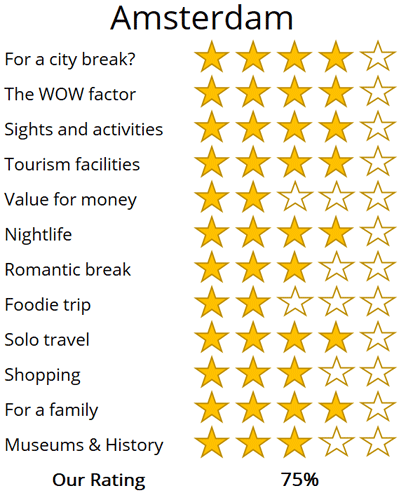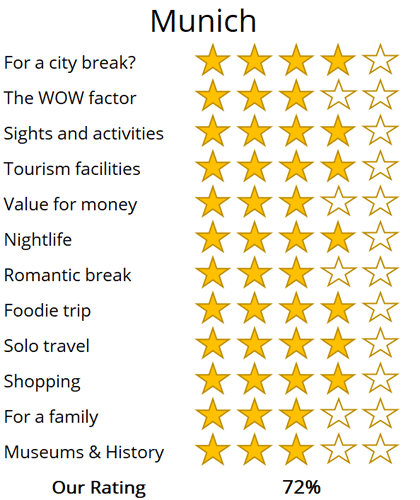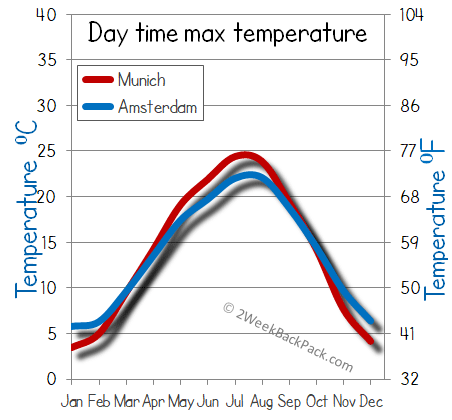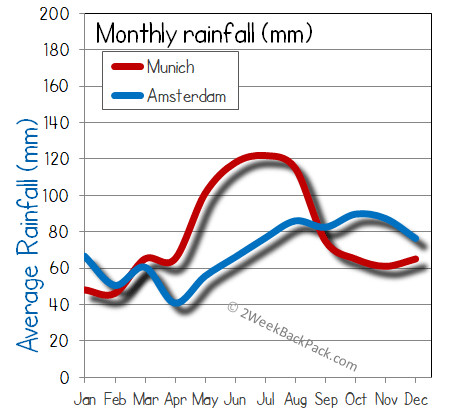WhereToGoForMyHoliday.com
The best destination comparison site!
WhereToGoForMyHoliday.com
The best destination comparison site!
Munich or Amsterdam, which is better for your holiday in 2024?
Amsterdam and Munich both offer unique and enticing experiences, but which one should you choose for your city break or holiday?
We recognise the difficulty in making this decision. While there is abundant information available on both destinations, clear guidance on which city better aligns with your travel preferences is often hard to find.
This article aims to provide an impartial comparison of Amsterdam and Munich, and hopefully help you to choose the best city to visit.
The article is structured into several sections, each of which can be directly accessed through the following links:
• Introduction to the cities
• Scores and ratings
• Which one should I, friends, or family visit?
• When to visit and weather
• Who is the city suited for?
• The perfect 48hours (with map)
• Tourism details (where to stay? airport details?)
Introduction to Amsterdam and Munich
Amsterdam, known as Europe's most liberal city, is an exceptional destination full of charm and unique character. While it continues to attract visitors drawn to its quirky and unconventional side, such as the famous coffee shops selling everything but coffee, and the infamous red-lit streets, the city is striving to transcend these stereotypes.
Today, Amsterdam is reinventing itself as a hub of culture and style, boasting world-class museums, a vibrant nightlife, and a welcoming attitude that distinguishes it from other cities. Far from a one-dimensional destination, Amsterdam offers an enriching experience that marries its lively past with an exciting and sophisticated future.

Munich is a vibrant city, ideal for a short trip
Beer-mad and shrouded by the mountains, Munich is the boisterous capital of Bavaria. It's in the deep southern reaches of the country, where lederhosen are the threads of choice and white sausage is served at breakfast. Proudly unique, romantic, and steeped in art and culture, you won't find anywhere else like this in Germany.
Of course, it's the legendary Oktoberfest that puts Munich on the map. One of the world's biggest festivals, it draws millions to the city in late September (yes, Oktoberfest is confusingly held in September) to glug huge beers and eat endless wurst. Trips at any other time of the year are sure to be a little more refined. They can involve long walks under Baroque churches, picnics in the English Garden park, and even daytrips to the stunning Bavarian Alps.
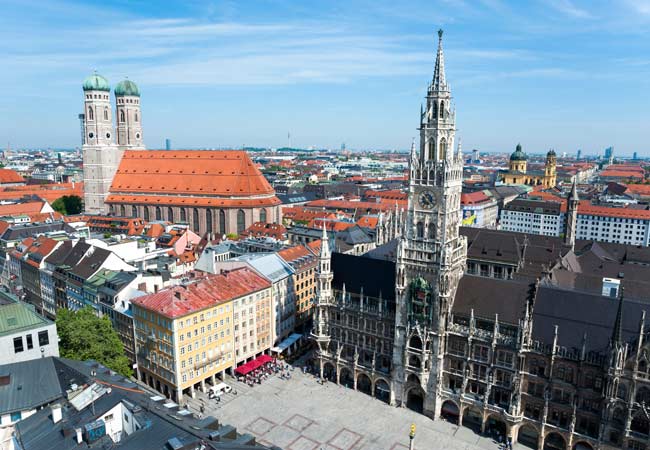
The Marienplatz and the historic centre of Munich, with the Frauenkirche Cathedral, and Neues Rathaus
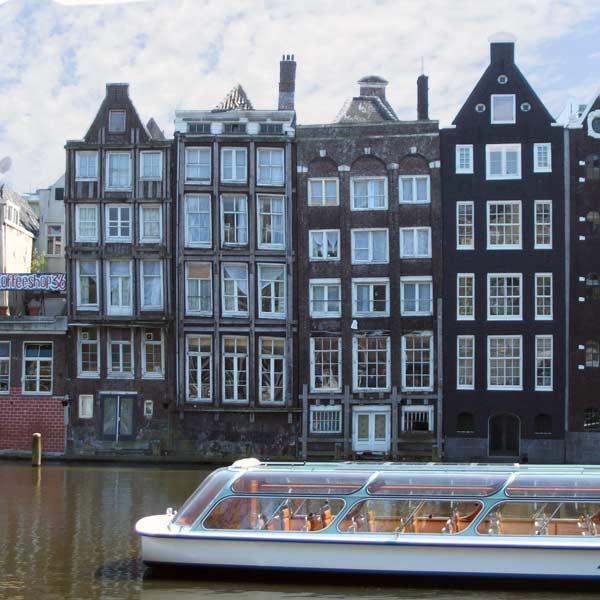
Singel canal in Amsterdam with typical Dutch houses and houseboats.
High-level summary Amsterdam and Munich
Summary
Where would I journey for a personal escape? Amsterdam
Where would I send my parents for a memorable visit?
Amsterdam
Where's the ideal destination for my adventurous 19-year-old cousin?
Amsterdam
Where should my food-obsessed friend indulge their culinary passions?
Amsterdam
Note: The above comparisons are weather-independent and are based on travel during the most opportune times of the year. Details about the ideal travel seasons are elaborated upon later in this article.
In the sections that follow, you'll find a comprehensive comparison between these two fascinating cities. This includes recommendations on the duration of stay, the best times to visit, and tailored 48-hour itineraries for each city.
The final segment delves into practicalities for your travels, such as the best airport to fly into, the optimal districts for your accommodation, and insider tips, for when you come to explore the city.
We hope that you find all of this information useful, in planning your next exciting trip!
Destination details
How long to spend each city?
Take a couple of days minimum to get a feel for the alternative vibes of Munich. You'll need at least a morning or two to check off the grand churches and plazas of the downtown. Afternoons are often lost to a haze of currywurst and spätzle. The evenings will disappear to clinking tankards and too much Bavarian beer.
If you're planning on joining the Oktoberfest party, then the normal amount of time to spend in the Munich event is two days. Some people will stick around longer but remember that accommodation can cost a bomb during festival dates and you'll need to book well in advance.
The closeness of the Alps and the wide variety of off-the-beaten-path neighborhoods in Munich mean that it's also possible to stay here for much longer than just a weekend or a couple of days. You could do weeks of hiking in the spring and summer months. Alternatively, you could do a full ski holiday in nearby Garmisch-Partenkirchen (Germany's biggest resort) during the winter.
A three-day stay is perfect to truly capture the essence of Amsterdam, allowing for a brief day trip beyond the city limits. Any shorter visit might feel hurried, particularly for first-time visitors.
If time allows, the surrounding area boasts a wealth of worthwhile destinations. Keukenhof, the world's largest flower garden, is a popular destination in spring. Additionally, the Zaanse Schans Windmills and the enchanting 'Kasteel De Haar' castle are nearby
Additionally, many visitors opt to explore the planned cities of Almere or Lelystad, constructed on reclaimed land and just a 20-minute train journey from the central station These modern cities take pride in showcasing cutting-edge architectural design.

Excessive amounts of beer, lederhosen, singing and crazy fairground rides… it can only be Oktoberfest
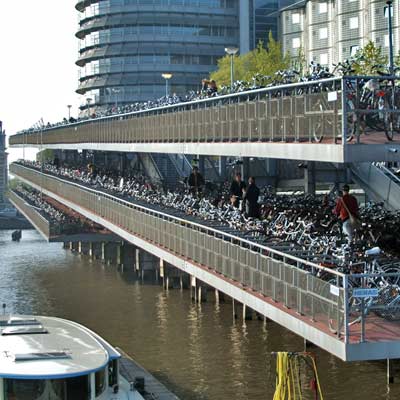
The Dutch love to cycle…..
Spring is the ideal time to visit Amsterdam, just before the rush of the summertime tourist season. During this period, you have the opportunity to partake in the festive King's Day celebration in April or marvel at the endless sea of tulips at Keukenhof.
August is Amsterdam's warmest month, with average temperatures hovering around 22 degrees Celsius (71°F) — a mild warmth by many standards! Winter can bring temperatures down to just above freezing, making for a chilly experience. The weather in Amsterdam is notoriously unpredictable throughout the year, so it's wise to come prepared for all conditions. Whether it's wind or rain, don't be surprised if at least one day of your visit is met with inclement weather.
Munich is one of those cities that has something going for it no matter the time of the year. Lots of people like the height of the summer, for the regular sun and temperatures that often spike above 30 degrees in the middle of the day. That's certainly perfect for wandering the town and enjoying the big lawns and paths of English Garden.
The autumn is best known for Oktoberfest. The shindig and the beer drinking begin in mid-September, lasting until the first couple of days in October. It's usually still warm for the party, but the days get shorter and jumpers will be needed as you get closer to November.
There's often snow in Munich from December onwards. This is the time of year to come if you have your sights set on the ski fields of the German Alps. The slopes of Garmisch-Partenkirchen typically open for business before Christmas, which is also when the enchanting markets start selling gingerbread and sausages on Munich's medieval squares.
Spring is also lovely. May is among the best months of all to travel. The summer crowds haven't arrived yet, the snows have melted, and thermometers can read a pleasant 20 degrees during the day.
Munich is unique in that it manages to fuse together the great outdoors, rich European culture, and an enticing foodie scene. That's all thanks to its place as the historic capital of Bavaria, which brings a long tradition of cooking, beer making, castle building – the list goes on.
The upshot? There are all sorts of travellers who are catered to, no matter if you come in search of pretzel eating or high-altitude trekking.
One thing you won't find in this city is the sea. The nearest saltwater is a hefty drive over the Alps in Italy or Croatia. So, don't come if you're pining to top up the tan and swim in the Med.
There’s something for everyone in Amsterdam.
While it has historically attracted hipsters, it also has a lot to offer to those looking for a peaceful and relaxed place to getaway. It’s easy to follow one of the canals out from Rembrandtplein in the centre to a quieter neighbourhood such as Jordaan or Prinsengracht either on foot or by bike, or even better, floating along by canal boat.
Believe it or not, Amsterdam is also an incredibly family-friendly city. The relaxed approach to parenting permeates its museums, sights and events and the city is home to hundreds of playgrounds and child-friendly cafes.
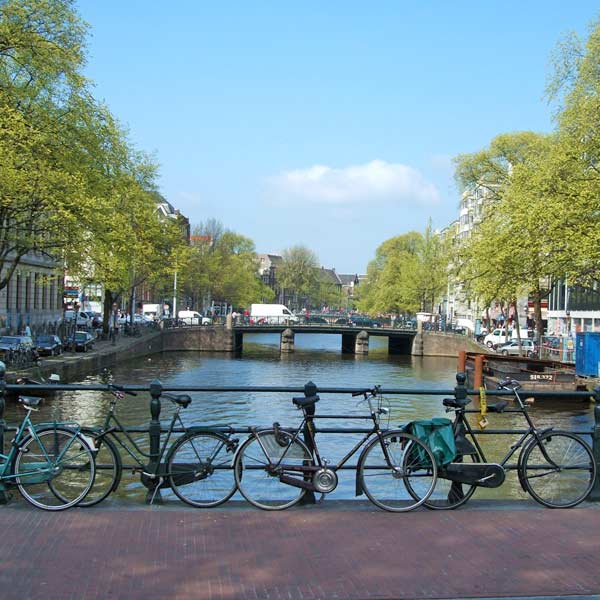
Amsterdam’s iconic canals, weaving through the city, create a picturesque and tranquil urban landscape

The Englischer Garten (English Garden) is the spawning park in the centre of the Munich
48hours in Munich
Sample Munich's famous food, beer, and regal inner city on this two-day itinerary that's packed with amazing palaces and parks. If you're hanging around for longer, then you should also have time to make a beeline for the Alps or explore those off-the-beaten-track neighborhoods, but that will have to wait…
Day 1: Your travels begin on the grand Odeonsplatz. A prime example of the city's 19th-century rebuilding, it hosts some of the most magnificent sights in the region. There's the huge, 130-room Munich Residenz, the onetime home of the Bavarian kings and queens. There's the Theatine Church from the 1600s, sporting its dual Baroque towers.
You only have 48 hours, but the palaces can be visited if you have extra time. Instead, move on through the heart of the city on Briennerstraße to the vast plaza of Königsplatz. This is a photo op extraordinaire, with handsome Neo-Classical monuments like the strange Propyläen. The area around that is the artistic quarter (the Kunstareal), where there are endless museums and galleries to go into if you need to warm up or escape the rain.
Next is the beautiful Frauenkirche. This is a symbol of Munich as a whole; a great church topped by bulbous domes on the central Frauenplatz. It will take around 20 minutes to walk over there, but you'll enjoy moving into the Altstadt area as you go. You should plan to spend the evening within, hopping between sights like the iconic Hofbräuhaus (the best known beer hall in the city) and the ancient Peterskirche (the oldest church in Munich).

The Schloss Nymphenburg and its beautiful grounds
Day 2: No visit to the grand royal capital of Bavaria could possibly be complete without at least a glimpse of the Schloss Nymphenburg. It's hardly central, but private tours can whisk you there and back in a single morning, going through the manicured gardens, the court rooms, and the curious Marstallmuseum with its gold-leafed carriages from the 19th century.
When you return back to the middle of Munich head straight for the English Garden. This is one of Germany's favourite parks. You could start by strolling up the Eisbach to see the surfers riding the river wave. Then explore the pretty Hofgarten, where babbling fountains and bandstands once provided a retreat for Bavarian royals. Alternatively, go straight to the Chinese Tower Beer Garden, to glug traditional German hops brews and taste bratwurst and pretzels until sundown.

The Olympiapark complex, constructed fro the 1972 Olympics
48hours in Amsterdam
Day 1: Start in the Museum Quarter, home to some of Amsterdam’s world-class museums. Here, you'll find the Rijksmuseum, housing Rembrandt’s famous 'The Night Watch,' as well as the Van Gogh Museum and Stedelijk Museum, which boasts an extensive collection of works from artists such as Picasso and Warhol.
In the afternoon, explore the charming artisan neighborhood of Jordaan, known for its houseboats along the quays and crooked historical buildings. For nightlife, the lively areas of Leidseplein or Rembrandtplein are perfect destinations.

Spring at Dam Square with the Royal Palace in the background.
Day 2: Begin with a visit to Dam Square and the Royal Palace, then venture into the red-light district. A trip to the Anne Frank House offers a poignant experience; booking online ahead of time is highly recommended..
For a more relaxed evening, capture a beautiful photo from the Magere Brug. After dark, this bridge, adorned with over a thousand lights, provides a vantage point from which you can see 15 bridges simultaneously.
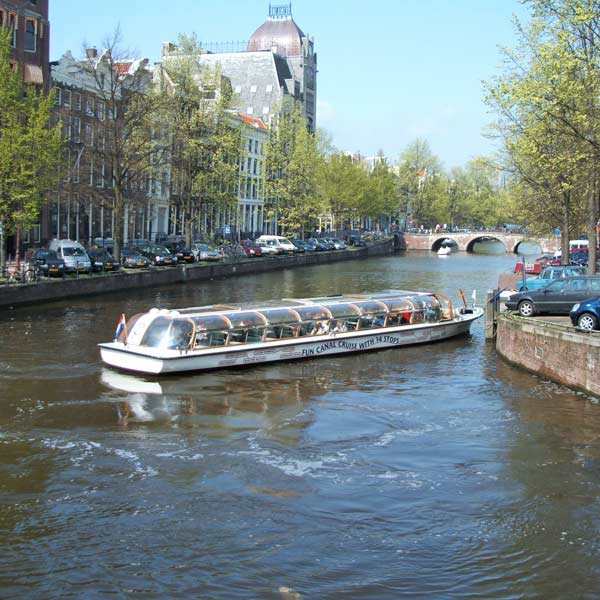
Boat cruise along a canal in Amsterdam
On arrival in Amsterdam Schiphol airport, the quickest way to get into town by public transport is the train which costs €5.40 and takes 20 minutes. The bus costs €5 and takes about 35 minutes.
Amsterdam is an expensive city. Walking and cycling are the best ways to get around. By boat you can see all the big sights too and there are many options for hop-on-hop-off. There is also an impressive public transport system of trams, buses, metros, trains and ferries to help you get around.

Rijksmuseum in Amsterdam
All cities have their perils but with regards to Amsterdam, probably the main ones to consider are bike safety and caution in the "coffee shops". As well as the usual bike safety rules you’d expect at home, keep an eye out for nippy scooters on the bike lanes and avoid rush hour if possible. In terms of the coffeeshop visits – don’t underestimate the effects of the products, as the varieties sold here are more potent than elsewhere.
Amsterdam is typically an extremely safe city for solo female travellers but it’s not advised to visit the Red Light District at night as the area does have a seedier vibe.
Munich International Airport is the second busiest hub in all of Germany. It's a major arrival point, with links coming in on premium and low-cost fliers from right around the globe. Getting to the city from the terminals is easy thanks to the direct S-Bahn line that runs straight to the train station. The trip costs just over €11 and takes around 40 minutes in total.
Long-distance overnight trains and local German trains alike will arrive at Munich Central Station. It's right in the heart of the city, within walking distance of the Altstadt and the Odeonsplatz. If you'd prefer not to walk to the door of your hotel, however, you can enter the S-Bahn or U-Bahn networks from there. Those, along with the comprehensive bus routes and tram lines, can get you virtually anywhere in the town. Basic one-way single tickets cost €2.80 per ride. Buy them at the blue vending machines located in the stations.
Munich is a safe, modern city. The locals are famed for their friendliness and welcoming attitude – a trait of Bavaria, they say. However, it's still important to be wary of scams and dangers, particularly during the Oktoberfest, when alcohol intake increases dramatically.
The best areas to stay in Munich are the Altstadt, the streets around English Garden, and the grand university and gallery area of Maxvorstadt. Cheaper hotels that are still within walking distance of the sights can be found south of the main train station around Bayerstraße.

The Odeonsplatz plaza and the distinctive yellow Theatine Church
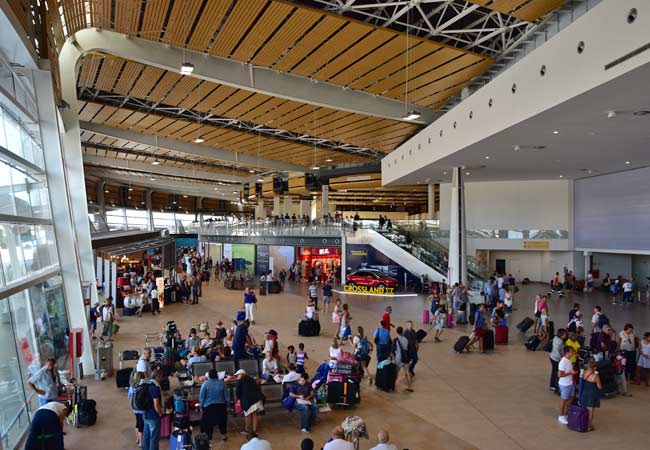
oh we were stuck in the airport!

Copenhagen was a bit expensive...

All we did was drink beer in Brussels...

Muncih was crazy
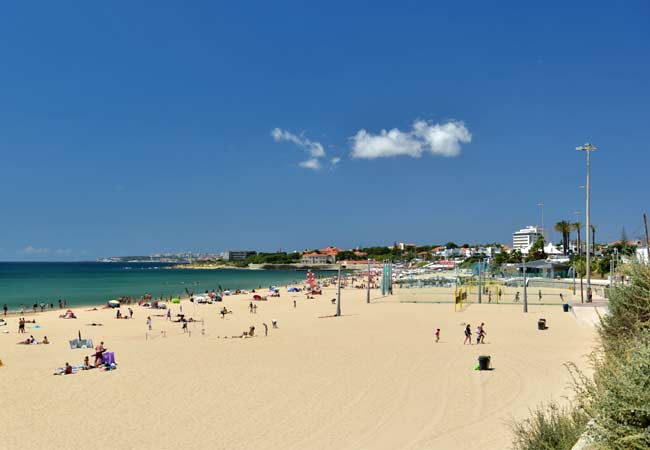
And we got so burnt!
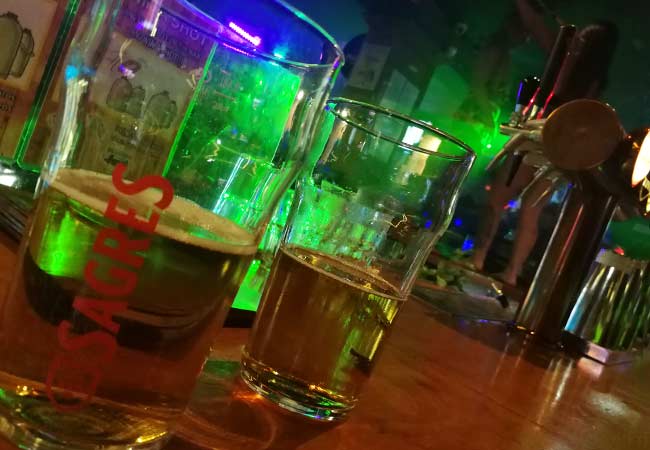
Remeber that night in Rome

oh we were stuck in the airport
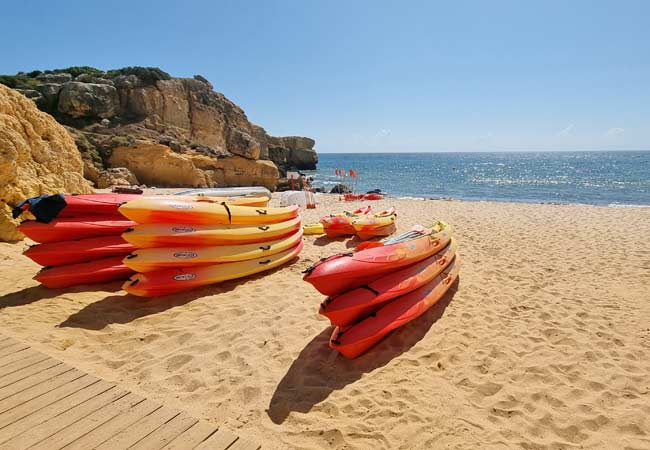
So much fun kayaking

Berlin and that group from Austria!

There was such a view from that church

And we got so burnt!

Munich was eventful, wasn't it!

Such a view from that cathedral in Florence
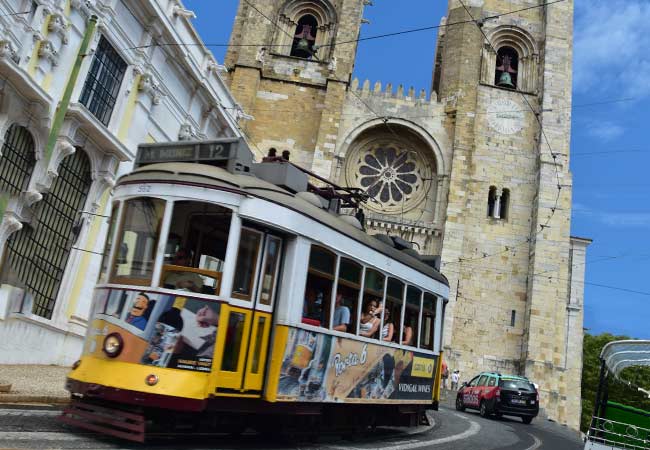
Lisbon was such so much fun

Last summer was so much fun .... x

Remeber that night in Rome

Lisbon was such so much fun

Such a view from that cathedral in Florence

Munich was eventful, wasn't it!

And we got so burnt!

Remeber that night in Rome

All we did was drink beer in Brussels...

Berlin and that group from Austria!

Can't wait to go back to Dubrovnik

Remember that boat ride in Prague

Copenhagen was a bit expensive...
